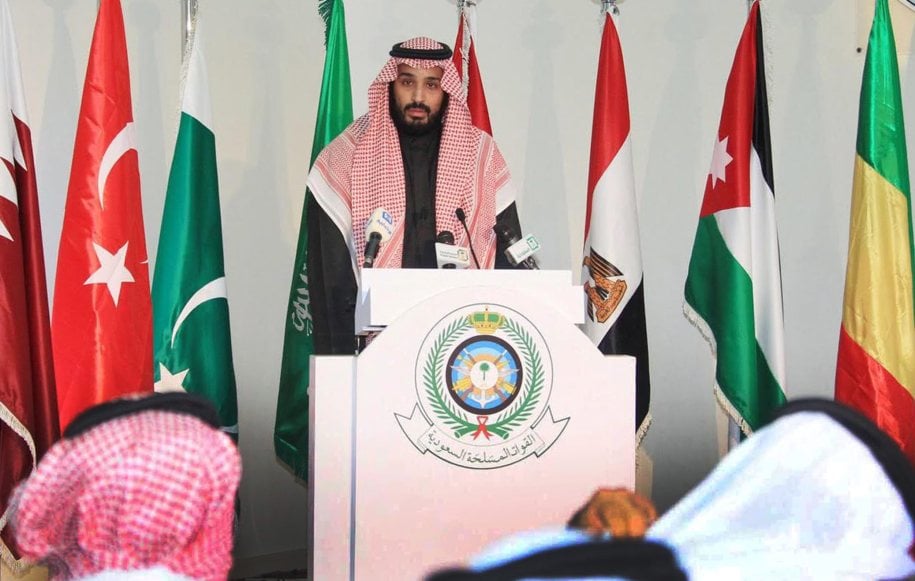
Saudi Deputy Crown Prince and Defense Minister, Mohammad bin Salman, discussing the Islamic coalition on Dec. 15, 2015 (Reuters).
During the Arab-Islamic-American summit in Riyadh, leaders and representatives from Arab and Muslim countries stressed their countries’ commitment to combating extremism and terrorism. At the summit, it was decided to establish a strategic alliance. Nations facing a ‘common threat’ often pool their defense efforts in alliances.
While the North Atlantic Treaty Organization (NATO) is a formal alliance, nations can also cooperate implicitly in informal ones. In fact, Saudi Arabia had already announced the formation of the Islamic Military Alliance to Fight Terrorism (the ‘Islamic NATO’) end of 2015.
In many ways, defense is a public (“collective”) good. This means consumption of the good by one person does not reduce the amount available for others to consume. It also means that the benefits a given person derives from the provision of a collective good do not depend on that individual’s contribution to funding it.
The same reasoning applies to countries within strategic alliances: whatever the nature of the Islamic NATO, the defense efforts aimed at its ‘common goals’ are a collective good.
Empirical evidence on the political economy of alliances tells us that wealthier countries—like Saudi Arabia and the United Arab Emirates (UAE)—would spend significantly more on defense. Smaller states will thus be more inclined to “free-ride” as long as everyone (in the Arab Gulf, the Levant, East Africa and the Sunni world) benefits.
Since the 1960s, “burden sharing” (the specific efforts each member has to make) has been a recurring test of the theory of collective action. As in the case of NATO, members of the Islamic NATO might often bargain over burden sharing. But any ambiguity in this definition will create further tensions within the Islamic alliance. For instance, the alliance might deploy forces in faraway places than the traditional theaters of Yemen, Syria or Iraq. Some members will try to do these missions on the minimum while continuing to cut their defense budgets in response to their macroeconomic difficulties, fiscal pressures and welfare state budgets at home.
In addition to the challenges of free-riding and burden sharing, a ‘shared goal’ (fighting terrorism) might lead to a massive growth of the size of government (among the bigger members of the alliance). When counter-terrorism ends, government control diminishes, but never back close to its pre-war level. In his book, Crisis and Leviathan, economic historian Robert Higgs was the first to point out this pattern (which he called the “ratchet effect”).
In other words, the leader of the Islamic NATO (Saudi Arabia) will face increased spending (in terms of increased defense/security spending; increased subsidies needed to increase public support for the increased provision of the collective good; possible financing of compulsory military service; and so forth). This entails that the Saudi government must obtain resources through the tax system (or through implicit taxation, such as inflation) adding further complexities to Vision 2030.
Another point on a ‘common threat’: the defense budgets of the Islamic NATO’s members will diverge as long as defense strategies and choices diverge. Allies would have differing views on the sources of threat to their national security: while some countries consider Iran as their chief source of threat; to others, the Islamic State (ISIS) is the chief threat.
In his classic work on what defense goals best meet threats; which military means best serve those goals; and how to compare the value of military and other spending, Warner Schilling attributes the difficulty to uncertainty about future threats with the result that “the defense budget, while susceptible to rational analysis, remains a matter for political resolution.”
The last two words above are critical for the Islamic NATO: how much defense is enough will be answered through politics and tradeoffs. Thus, larger members will be promising private goods (especially financial aid and/or regional investments) to smaller ones in return for contribution to the public ones. Yet, this strategy is extremely expensive and usually well beyond the means of all states except, for the time being, the leader of the alliance (Saudi Arabia).
Also, we should expect smaller states which strongly identify their “special relationship” with Saudi Arabia as an important key to their security and their political clout to be willing to contribute significantly (both in terms of troops and risk-sharing).
Islamic NATO could survive, if and only if Saudi Arabia carefully compares other goods to offer (than public goods) and assesses the burden sharing perspectives within the alliance. That said, smaller members can and should be expected to provide their comparative advantage in areas such as ground forces and niche capabilities.
If the above-mentioned challenges are hard to reach, the Islamic NATO will be a fractured, uniquely privileged group.